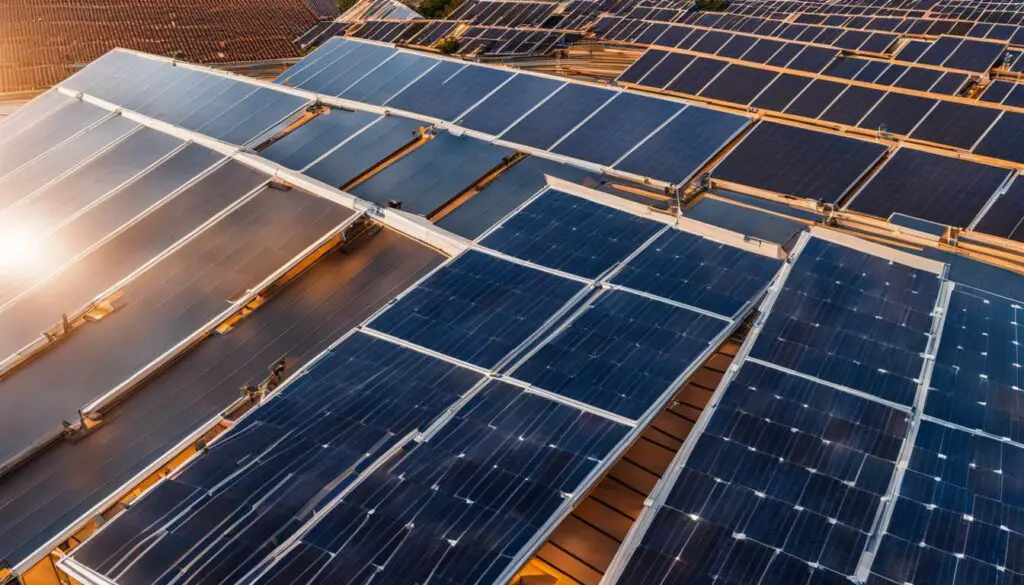In today’s world, where energy consumption and environmental sustainability are of utmost importance, finding ways to enhance energy efficiency in our homes has become a top priority. Fortunately, advancements in smart home technology have provided us with a multitude of solutions to achieve this goal.
Smart home technology encompasses a range of eco-friendly devices and energy-efficient appliances that work together seamlessly to optimize energy usage and promote sustainable living. From smart lighting systems that adjust automatically to reduce unnecessary energy use, to home automation that enables efficient control of various devices, smart home technology offers a plethora of energy-saving solutions.
Table of Contents
Key Takeaways:
- Smart home technology offers a range of solutions to enhance energy efficiency in homes.
- Smart lighting systems and home automation enable efficient control and reduce unnecessary energy use.
- Smart appliances and energy-efficient HVAC systems optimize energy consumption.
- Solar panels integrated with smart home technology harness solar energy effectively.
- Smart home energy management systems provide comprehensive insights and suggestions for energy savings.
Ways to Use Smart Home Technology for Energy Efficiency
Smart home technology offers a multitude of innovative solutions to enhance energy efficiency, allowing homeowners to reduce their carbon footprint and save on utility bills. By leveraging the power of smart thermostats, lighting systems, power strips, appliances, windows, solar panels, energy management systems, HVAC systems, water heaters, and landscaping, households can optimize energy consumption. Let’s explore some practical ways to use smart home technology for energy efficiency:
1. Smart Thermostats

Smart thermostats, such as those offered by popular brands like Nest and Ecobee, learn temperature preferences and automatically adjust the temperature settings in your home. By optimizing heating and cooling based on your daily routine, smart thermostats provide comfortable conditions while conserving energy.
2. Smart Lighting Systems
With smart lighting systems like Philips Hue or Lutron Caseta, you can schedule lights to turn on and off automatically. Occupancy sensors and remote control features ensure that lights are only used when needed, reducing unnecessary energy usage.
3. Smart Power Strips
Smart power strips, such as the Belkin Wemo or TP-Link Kasa, allow you to control multiple devices remotely. By cutting off power to devices in standby mode, you can eliminate standby power consumption and reduce your energy bill.
4. Smart Appliances
Incorporating smart appliances into your home, such as refrigerators with built-in cameras from Samsung or energy-efficient dishwashers from Bosch, provides greater control over energy usage. Energy-saving features and advanced monitoring capabilities help minimize energy waste and maximize efficiency.
5. Smart Windows
Smart windows, like SageGlass or View Dynamic Glass, automatically adjust tint levels based on sunlight and temperature. By reducing the need for artificial lighting and managing heat gain, smart windows contribute to energy savings and provide a comfortable living environment.
6. Solar Panels

Integrating solar panels with smart home technology optimizes the use of renewable energy. Smart inverters and monitoring systems enable efficient solar energy production and provide real-time data on energy generation and consumption.
7. Smart Home Energy Management Systems
Smart home energy management systems, like Sense or Curb, provide real-time insights into energy consumption. By monitoring and analyzing data, these systems suggest personalized energy-saving strategies and highlight areas for improvement, empowering homeowners to make informed decisions.
8. Smart Energy Storage Systems
Smart energy storage systems, such as the Tesla Powerwall or LG Chem RESU, store excess energy generated by solar panels for use during periods of low generation or high demand. This helps optimize energy usage and reduces reliance on the grid.
9. Smart HVAC Systems
Smart HVAC systems, like those offered by Carrier or Lennox, offer advanced temperature control and air quality management. With features such as programmable schedules and occupancy sensing, these systems ensure energy-efficient heating and cooling while maintaining optimal comfort.
10. Smart Water Heaters
Smart water heaters, such as Rheem or A.O. Smith models with Wi-Fi connectivity, allow homeowners to control and schedule the operation of their water heating systems. By optimizing usage based on daily routines, these devices minimize energy waste and reduce utility costs.
11. Smart Landscaping
Smart landscaping involves using drought-resistant plants, smart irrigation systems, and moisture sensors to minimize water consumption. By leveraging smart technology, such as the Rachio Smart Sprinkler Controller or Orbit B-Hyve, homeowners can achieve both energy and water savings.
Implementing these smart home technology solutions enables homeowners to achieve significant energy savings, reduce their ecological impact, and create more sustainable living environments.
The Benefits of Smart Home Energy Solutions
Smart home energy solutions offer numerous benefits. By integrating renewable energy sources, such as solar power and wind turbines, into smart home setups, households can optimize energy management and reduce their reliance on grid-supplied electricity. This not only promotes a more sustainable lifestyle but also helps lower carbon emissions.
One of the key advantages of smart home energy solutions is the inclusion of battery storage systems. These systems allow households to store excess energy generated from renewable sources, like solar panels, making it available even during periods of low energy generation. By effectively storing and utilizing this energy, homeowners can ensure a consistent power supply and further minimize their dependency on the grid.
Energy monitoring and management systems, including smart meters, play a pivotal role in empowering households to make informed decisions about their energy consumption. Real-time data on energy usage and costs enable homeowners to identify areas of high energy consumption and take necessary steps to reduce usage. This not only helps in cutting unnecessary expenses but also facilitates a more sustainable approach to energy consumption.
Artificial Intelligence in Smart Home Energy Systems
The integration of artificial intelligence (AI) into smart home energy systems brings additional benefits and efficiencies. AI algorithms can analyze energy usage patterns, forecast renewable energy generation, and enable demand response management. By leveraging AI capabilities, smart home energy systems can optimize energy usage based on individual preferences and external factors, leading to further energy savings and greenhouse gas reductions.
AI-powered smart home energy systems have the potential to revolutionize the energy landscape, making it possible for homes to actively participate in grid flexibility programs and support a more renewable and sustainable energy infrastructure.
In addition to AI, smart appliances are another significant aspect of smart home energy solutions. Devices such as smart thermostats, lighting systems, and appliances optimize energy usage by adjusting settings based on occupancy, time of day, and even weather conditions. This level of automation ensures that energy is only consumed when necessary, reducing waste and maximizing efficiency.
Flexible grids, a crucial component of smart home energy solutions, enable the seamless integration of renewable energy sources. By promoting collaboration and interoperability among smart home energy devices and systems, flexible grids create a robust energy ecosystem. They facilitate the implementation of demand response programs, where homes can adjust their energy consumption in response to grid conditions, contributing to a more stable and sustainable energy grid.
In summary, embracing smart home energy solutions offers numerous benefits, including increased energy efficiency, reduced utility bills, and a more sustainable lifestyle. By integrating renewable energy sources, utilizing energy storage systems, leveraging AI, and optimizing energy usage with smart appliances, households can contribute to a greener future while enjoying the financial and environmental advantages of energy efficiency. Collaboration and interoperability among smart home energy devices and systems are key to creating a seamless and user-friendly experience. It’s time to harness the power of smart home technology to achieve a more efficient and sustainable energy future.
The Future of Smart Home Energy Technology
The future of smart home energy technology holds several exciting trends. Integration of renewable energy sources, such as solar power and wind turbines, will continue to play a significant role in smart home energy solutions.
Energy storage systems, including improved battery technology, will allow for better harnessing of renewable energy and increased energy sustainability. With advanced energy storage capabilities, homeowners can store excess energy generated from renewable sources and use it during periods of low energy generation or high demand.
Energy monitoring and management systems, powered by artificial intelligence (AI), will become more sophisticated and offer features like predictive maintenance and energy usage optimization. AI-powered algorithms can analyze energy consumption patterns and make real-time adjustments to optimize energy usage, detecting inefficiencies and suggesting improvements.
Smart appliances will continue to enhance energy efficiency and become more prevalent in households. These appliances can intelligently optimize energy usage based on user preferences, occupancy detection, and external factors like weather conditions. For example, smart refrigerators can adjust cooling settings based on the contents and optimize energy consumption.
Grid flexibility will evolve to accommodate the increasing integration of renewable energy sources and promote a more resilient and sustainable energy infrastructure. Demand response programs will allow homeowners to adjust their energy usage patterns based on grid conditions and incentives, contributing to overall grid stability and reducing strain during peak demand periods.
Collaboration and interoperability among smart home energy devices and systems will be crucial in delivering seamless integration and a better user experience. By ensuring that different smart devices and systems can communicate and work together seamlessly, homeowners will have a more cohesive and efficient smart home energy ecosystem.
The future of smart home energy technology promises even greater energy efficiency, reduced environmental impact, and cost savings for households. As advancements continue to be made in renewable energy, energy storage, AI, and smart appliances, homeowners can look forward to a future of sustainable and intelligent energy management.
With the integration of renewable energy sources, improved energy storage solutions, advanced energy monitoring fueled by artificial intelligence, and the widespread adoption of smart appliances, the future of smart home energy technology is bright. Homeowners can embrace these advancements and make their homes more energy-efficient, eco-friendly, and cost-effective.
Conclusion
Smart home technology presents a myriad of solutions to enhance energy efficiency and support sustainable living. By embracing a range of smart devices and systems such as thermostats, lighting, power strips, appliances, windows, solar panels, and energy management systems, households can significantly reduce their energy consumption and cut down on utility bills. Integration of renewable energy sources like solar power and wind energy with smart home technology facilitates cleaner and more sustainable energy generation. Furthermore, the application of artificial intelligence optimizes energy management, ensuring efficient resource utilization.
Collaboration and interoperability among smart home energy devices and systems play a vital role in providing a seamless user experience. The ability of different devices and systems to communicate and work together enhances the overall efficiency and effectiveness of energy-saving solutions. By embracing smart home technology, households can unlock its potential to improve energy efficiency and achieve a more sustainable future.
Investing in smart home technology not only benefits individual households but also contributes to the greater goal of environmental preservation. By reducing energy consumption and relying on renewable energy sources, we can collectively create a greener and more sustainable world. Let us embrace the power of smart home technology and take a step towards a brighter, energy-efficient future.
FAQ
How can smart home technology enhance energy efficiency?
Smart home technology can enhance energy efficiency by utilizing features such as smart thermostats that adjust temperature preferences, smart lighting systems that automatically turn on and off, smart power strips that eliminate standby power consumption, and smart appliances that optimize energy usage.
What are the benefits of using smart thermostats?
Smart thermostats learn temperature preferences and adjust the temperature in the home accordingly, resulting in energy savings and increased comfort.
How do smart lighting systems contribute to energy efficiency?
Smart lighting systems can be programmed to turn on and off automatically, ensuring lights are only used when needed and reducing unnecessary energy use.
How can smart power strips help reduce energy consumption?
Smart power strips allow for remote control of multiple devices, eliminating standby power consumption and reducing energy waste.
How do smart appliances contribute to energy efficiency?
Smart appliances provide more control and can reduce energy waste by optimizing energy usage. For example, smart refrigerators with built-in cameras help minimize energy consumption by adjusting cooling settings based on contents and usage patterns.
What are the advantages of using smart windows?
Smart windows automatically adjust tint based on sunlight, reducing the need for artificial lighting and promoting energy savings.
How can solar panels integrated with smart home technology optimize energy usage?
Solar panels integrated with smart home technology optimize the use of solar energy by tracking sunlight patterns and adjusting the energy generation accordingly.
What are smart home energy management systems?
Smart home energy management systems provide a comprehensive view of energy consumption and suggest ways to save energy, allowing homeowners to make informed decisions for energy efficiency.
What is the role of smart energy storage systems in energy efficiency?
Smart energy storage systems store excess solar energy for use during periods of low generation, ensuring energy availability and reducing dependence on the grid.
How can smart HVAC systems contribute to energy efficiency?
Smart HVAC systems can adjust temperature preferences based on occupancy, optimize energy usage, and improve air quality, leading to increased energy efficiency.
How do smart water heaters promote energy efficiency?
Smart water heaters can be controlled and programmed for energy efficiency, allowing homeowners to heat water only when needed and reducing energy waste.
How does smart landscaping contribute to energy efficiency?
Smart landscaping, such as using drought-resistant plants and irrigation systems controlled by smart technology, helps reduce water consumption and promote overall energy efficiency.
What are the advantages of investing in smart home technology for energy efficiency?
Investing in smart home technology can lead to significant energy savings, reduced utility bills, and a more sustainable lifestyle.


